#quick writing tips
Text
How to Write Betrayal
Betrayal is a powerful plot element that is represented in countless stories. The gravity of betrayal brings a profound depth to character dynamics, plots, and themes alike, making it an indispensable tool for writers to explore emotions, conflicts, and the complexities of human nature. Let’s explore some quick tips on how to write betrayal!
Behaviour
Secretive actions
Dishonesty
Becoming emotionally distant
A sudden change in routine
Pushing people away
Nervous or fidgety movement
Frequent lying or making up stories
Unexpected aggression or irritability
Unjustified mood swings or emotional outbursts
Increasingly defensive
Interactions
Disturbed interpersonal relationships
Frequent misunderstandings or fights
Withholding information
Avoiding personal discussions
Insincerity in conversations
Frequently cancelling or missing plans
A sudden shift in relationship dynamics
Quick to deflect or place blame
Frequent subject changes
Gradual emotional detachment
Body Language
Avoiding direct eye contact
Defensive stance and crossed arms
Covering mouth or touching face
Shuffling or restless movements
Forcing smiles or laughter
Constantly looking around or at the ground
Stiff, tense posture
Heavy breathing or frequent sighing
Avoiding touch or skin contact
Exaggerated gestures
Attitude
A lack of concern or empathy
Increasingly personal and hurtful arguments
Erratic or unpredictable reactions
Self-centeredness
Insincerity
Dismissive or negative attitude
Callous disregard for other's feelings
A negative or pessimistic outlook
Inability to handle criticism
Withdrawal from relationships
Positive Story Outcomes
In the wake of a betrayal, a story can manifest various positive outcomes that add depth to the plot and its characters. Relationships can be strengthened, showing their resilience. Characters may discover newfound self-reliance and learn valuable lessons about trust and forgiveness, leading to an increase in empathy and understanding, personal growth, and the reinforcement of personal values. These experiences can encourage a clearer understanding of personal boundaries, prompt self-reflection, introspection, and the development of healthier coping mechanisms. Ultimately, these positive outcomes can bring about improved communication and honesty, forming the silver lining in the cloud of betrayal.
Negative Story Outcomes
The aftershocks of betrayal can reverberate throughout your story. This might include an irreparable fracture of trust and damage to relationships. Betrayal can trigger psychological trauma, leading to an increase in suspicion and insecurity. Feelings of inadequacy or self-blame may surface, and characters can experience a heightened sense of isolation. The fear of forming new relationships or trusting others can become overwhelming. There may also be an escalation of conflict or violence and the reinforcement of negative behaviours or patterns. Damaged self-esteem or self-worth may be another repercussion, and this can encourage destructive coping mechanisms.
Helpful Synonyms
Treachery
Deception
Double-crossing
Duplicity
Backstabbing
Two-faced
Disloyalty
Unfaithfulness
Infidelity
Falseness
Perfidy
Treason
Fraud
Deceit
Slander
Misrepresentation
Falsification
Chicanery
Double-dealing
#writers#creative writing#writing#writing community#writers of tumblr#creative writers#writeblr#writerblr#writing inspiration#writing tips#writblr#writers corner#writing quick tips#quick writing tips#writing resources#writing advice#writer#on writing#writers block#beat writers block#let's write#writing betrayal#writing emotions#character development#writing characters#advice for authors#references for writers#helping writers#writing help#help for writers
6K notes
·
View notes
Text
Keys to Crafting Characters Readers Will Root For (w/ some examples)
As a writer and while making up this blog, I’m quite adamant that characters are just as important (if not more) as plot. In the grand scheme of things, an active, relatable, and engaging main character is crucial for a novel's success. But how exactly do we make a character all these things? There’s many ways, in fact. It is up to us as authors to keep track and manage the developmental arc of our protagonist: primarily, who they are on the inside, and how they grow or change / adapt to the situations or people around them.
Here are some examples and tips to help you develop a compelling protagonist (or all kinds of characters). Keep in mind these tips are at their most basic, essential level (there’s just so much that can be explored in each one), so I hope to go further into each point sometime in the future.
~`* They have clear goals and motivations.
First things first: you’d want to clearly define your character's goals and motivations — and the sooner, the better. Proper and well-set goals and motivations provide a sense of direction to the narrative. They should be specific, measurable, and achievable — or perhaps, not achievable, at least to its fullest extent. This would ultimately depend on the type of arc or ending you intend to write for your story, but there should at least be some main goal the character is vying for, and a motivation that dictates how much they want or need it.
For example: An aspiring actress hoping to make it to the stage and audition for the lead role in her favorite play.
—> Why does she want to be an actress so badly? What does it mean to her to act in her favorite performance? What does she have to prove, to herself or others?
~`* They are flawed, yet relatable:
I’m sure you’ve all heard this before… but I’m still going to reiterate:
Your character should have relatable flaws that readers can sympathize with. It’s no secret that flaws make characters human and relatable. Flawed characters help us remember that nobody’s perfect, and that we’re not alone in our struggles and in our plights (stay back, Mary Sues!). These flaws can be anything, from fears, limitations, biases, misbeliefs, quirks, shortcomings, or behaviors. It’s useful two have at least two: a minor flaw and a major flaw, where the former affects only the only character and nothing else, and the latter hinders the character and affects the plot.
For example: A highly-knowledgeable yet socially awkward and oblivious professor who can hold a bar of soap better than a conversation.
—> Does this flaw make him out to be charming or weird to others? How can his social-awkwardness affect the plot… does it hinder him from connecting to his students or colleagues?
~`* They have unique talents or interests.
Sometimes I read a story, and personally I have a hard time connecting with a character if all they care about from beginning to end is what’s happening in the plot. It’s like they exist for the sole purpose of the plot, and are nothing but a shell to see through the events or its challenges. This is understandable, especially when it’s an action-packed story or thriller.
Personally, I can’t help but wonder what its main character does for fun. What they’re like before the events of the novel.
I think it can be useful your character skills or interests that set them apart. This not only makes them interesting, but can drive the plot in unexpected ways. *Bonus points if they have a particular skill or hobby that conflicts with the way they present themselves to others, or if they hide it well if they are embarrassed by it or afraid of getting judged. Essentially, this is all to clue-in on the reader to the character’s backstory, their personality. It helps them seem more individualistic, like humans with their own sets of interests or ideas that give them more complexity and uniqueness. This can also be useful in creating parallels or connections to your story’s themes or your character’s arc.
For example: A brave warrior with an aptitude for gardening and flower arranging.
—> Seems random, right? But what if this warrior had workin in their relative’s flower shop, and has kept the skill alive in their days of battle to see pieces of beauty around them, hope from fear and danger? They might dig graves of their fallen friends and leave behind flowers in remembrance. Just an obscure example, but see all the possibilities something like this can open up?
~`* They have deep, complex relationships.
Sometimes we can get a better idea of a character when we see them interact with the people around them. It’s like showing vs. telling, where we get a firsthand look at how the main character treats his family members, how he accepts or refuses help from those he’s close with, what he appreciates most about his significant other, how he feels about the annoying neighbor next door. Who’s the one person they most admire and never want to let down? Who’s the one person they despise with all their body and soul? Whether it's friends, family, enemies, or romantic entanglements, complex interactions and relationships add layers to your character and in how they showcase themselves to the world.
For example: An excellent, compassionate therapist with a strained relationship with his own family member.
—> How does this character feel about this kind of relationship? Does it stem out of shared family troubles, or something deeper? Is there a glimmer of possibility the therapist might reconcile with this relative, or are they dashed because of mutual pride or distrust?
~`* They often face moral dilemmas.
It’s time to get philosophical. Human nature is full of paradoxes and tough moral questions, and so characters with conflicting qualities can be intriguing and relatable. Introduce moral dilemmas and conflicting values that force your character to make tough choices and confront their conflicting values. Do they have a friend with conflicting beliefs that challenge their own? Are they forced to act a certain way because of external pressures? Are they forced to choose between saving one person while destroying another?
No matter how serious this dilemma is, you can also add a moment of clarity or self-awareness for your character. This can be a turning point where they acknowledge and confront the conflict within themselves, thus becoming face-to-face with their internal crisis and how they decide to go from there. Do they weigh the pros and cons considerably, do they fumble because they’re hesitant, or do they embrace the new changes?
Despite conflicting values, make sure your character's behavior is consistent with their established personality. Consistency helps maintain authenticity and keeps the character grounded.
For example: A scientist torn between protecting humanity and the pressure of making a groundbreaking discovery.
—> How does making this discovery very important to this character? What do they stand to lose… what do they stand to gain? Are they at the risk of becoming something completely opposite of who they were at the beginning of the story, losing their sense of morality or forced to choose a side?
~`* They show their quirks and habits.
Introduce quirks or habits that make your character memorable. These little details can make the character more relatable and interesting, because just like talents or hobbies, this can also give a clearer sense to the reader of what kind of personality the character has and what they’re like. Not to forget, it also helps them to stand out from other characters on the page, giving them a unique voice with their kind of dialogue, their behaviors, style, and mannerisms.
For example: A scholar who can focus only if she’s chewing gum or wearing her lucky ring.
—> How might’ve this character started this habit or tradition? Does it actually work? Does it not work, but they still do it anyways because it’s comforting for them? Also, where did they get this quirk from?
~`* They have a backstory.
Most of what we’ve been discussing in this post already leaves some framework for the character’s backstory. It’s important to have a meaningful backstory in mind that influences the character's present actions and explains why they are they way that they are. This adds depth and helps readers understand their fears, desires, and motivations better; not shallow and two-dimensional as cardboard cut-outs.
Sometimes we don’t get a backstory for our character right away. Backstories takes time to brainstorm and shape — let alone into a complex or compelling one — but its helpful to trust the process. What you can do if you’re still looking for the right one, is to ask yourself questions on things that matter to you most. This pertains to your story’s themes and other main ideas you may like writing about, such as grief or family matters. It all boils down to who your character is (the present), and where it stemmed from (the past). If we take this a step further: does this backstory guide them or force them to make changes within themselves, thus leading to their changed self at the end of the novel/series (the future)?
For example: A woman with a fear of marriage because she’s seen firsthand its faults, including her own parents’.
—> Is her parents’ divorce still something she’s struggling to come to terms with? Is her misbelief equating marriage to constant conflict? Does she have a secret desire to get married, yet it put off by its pressures? Does she make up for this fear by focusing on other matters? Will this fear later be disproven?
~`* They are often vulnerable.
Every hero needs vulnerabilities. Imperfections. Weaknesses. We’ve talked about strengths and flaws before, but giving them that dent in their armor, any little opening someone or something might get through, leaves a reminder that no one, especially our hero, is invincible. Nobody’s perfect, after all (side-eyeing you, Mary Sues…). Make your characters messy: adding vulnerabilities helps makes them more authentic and genuine, opening up chances for them to learn and evolve as the story moves along.
It can also add a layer of suspense to the story, especially in conflict and tension. How will the character handle someone breaking their walls down, or a bad experience threatening to make them crumble and fall back to old habits? How do they handle their insecurities? How well do they hide their fears, and will they ever admit them?
For example: An old woman with bad eyesight and lives alone can’t tell that the reluctant robber breaking into her home is not her grandson.
—> This is a fun little example that opens up many possibilities. Her bad eyesight is a physical vulnerability, and so is her soft spot for her supposed grandson. The robber notices this, and he too may have a soft spot for any old woman who treats him kindly. Does he use this to his advantage to rob the house, or does he humor her for a while?
I’d definitely like to expand on these tips sometime. If there’s anything you’d like to share or add, please do so! I’d love to hear y’alls thoughts. Hope this helped!
#on writing#writing advice#creative writing#fiction#writing#writing tips#character#story tips#story conflict#writeblr#writers on tumblr#writers and poets#bookblr#quick writing tips#writers#writerscommunity#writer things#helping writers#writing inspiration#help for writers#how to write#writing tips and tricks#writing help#fiction writing#writer tips#writing tools#writer stuff#writing resources#writers of tumblr#writing community
55 notes
·
View notes
Note
Hey, I just wanted to know if you can explain how to describe driving in a car in a story. I'm stuck on how to explain that the car drove around the fountain.
Thank you!
Depends on what you want to evoke by the description -- the mood of the driver, for example, makes a huge difference.
If the driver is anxious -- maybe looking for something -- you can make it feel disorienting. If the driver is admiring the beauty of the fountain, describe that.
You don't need to say much about the mechanics of driving, unless it pertains to the plot. "She drove around the fountain, cobblestones bumpy beneath her tires, and chuckled to herself at the streams of water gushing from the stone horse's nostrils" would be just fine.
If the car stalls, if the character is concerned it might stall, if there are a lot of people around and the driver doesn't want to accidentally hit someone, if they're running low on gas, et cetera. Again, so much of this depends on context.
You can ground the reader a bit by adding a couple sensory details, such as the smell of the car (leather or plastic), the atmosphere (the air conditioner or radiator), or any details that indicates something about the character.
The important thing is the character, and the car is a vehicle (pun intended) through which to deliver information about the character.
I hope this helps somewhat!
24 notes
·
View notes
Text
Struggling to keep an update schedule, I'm sure most of you can relate. I know what I want to happen but when I try to write it down, I come up blank. Writer's block is more like writer's dissonance.
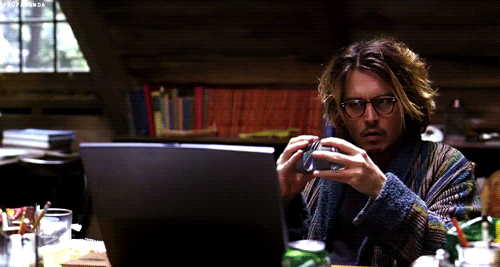
#writers#creative writing#writing#writing community#writers of tumblr#creative writers#writing inspiration#writeblr#writerblr#writing tips#writblr#quick writing tips#tropes#writing things#writer things#just write#writing inspo#creative inspiration#wattpad
0 notes
Text
Writing Exceptional Characters Part One Backstory
Writing Exceptional Characters Part One Backstory
Hey! Join us this week as we talk about writing exceptional characters starting with backstory! It’s quick. It’ll make you a better author. It’s free. 🙂
My poor rescue dogs have pretty rough backstories.
In between starting a new business, a new true-crime podcast, and local news blog, and editing other people’s stories, I’ve actually started my own new book that I’m pretty excited about, but…
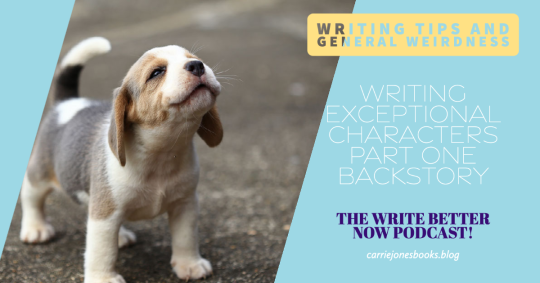
View On WordPress
#amwriting#backstory#carriejones#characters&039; backstory#dogsaresmarterthanpeople#exceptional characters#podcast#quick writing tips#writing#writingcommunity#writinglife#writingpodcast#writingtips
0 notes
Text
How your disabled character's allies react to their disability can make or break the representation in your story: Writing Disability Quick Tips
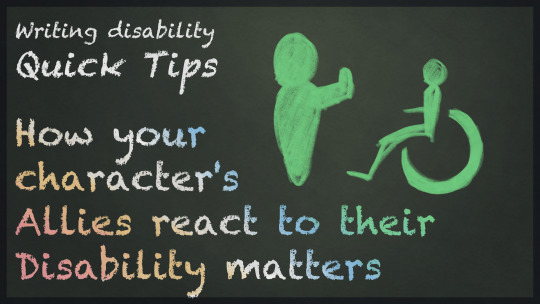
[ID: An image with “Writing Disability quick tips: How your character's allies react to their disability matters” written in chalk the colour of the disability pride flag, from left to right, red, yellow, white, blue and green. Beside the text are 2 poorly drawn people icons in green, one is standing with their hand up to the face of the other, who is in a wheelchair. /End ID]
Something I brought up in my big post about Toph Beifong was how the other characters reacted to Toph pointing out that things were not accessible to her and setting boundaries regarding her disability, which were ignored. I had more to say about it than I thought I did, as it turns out (when isn't that the case lol) but I feel like this is an important aspect of disability representation that is all too often over looked.
You can write the best, most accurate portrayal of a specific disability ever put to screen or page, but it won't mean much if all the other characters, specifically those we're supposed to like and empathise with, treat your character terribly for being disabled and having needs relating to said disability, especially if the story justifies their behaviour.
You see this most often with autistic characters and especially autistic-coded characters. The character in question will be given a bunch of autistic traits, most often traits relating to not understanding certain social dynamics or sarcasm, and when they get it wrong, the other characters we are supposed to like jump down their throat, tease them or outright abandon them.
Autism isn't the only disability that gets treated this way, but it is one of the more common ones that get this treatment. It doesn't matter if you do everything else right when creating an autistic character if the other "good guys" constantly call them annoying, get angry at them or laugh at them for the very traits that make them autistic, or for advocating for their needs.
Likewise, if you have a leg amputee character who is otherwise done well, but is constantly being criticised by their allies for needing to rest their legs or taking too long to get their prosthetics on, it undermines a lot of the other work you've done. Same goes for having a wheelchair user who is accused of being a bore or a stick in the mud because they point out the places their friends want to go to on a group holiday have no wheelchair access, or a deaf character who is accused of being entitled for wanting their family to learn to sign, or anything else.
This isn't to say you can never have moments like these in your stories, but its important to remember that a) people with the same disability as your character will be in your audience. If you spend a whole season of your TV show shaming your autistic character for real traits that real autistic people have, they're not exactly going to feel welcome and may not want to hang around. b) it's going to very, very heavily impact people's perceptions of your "heros" who do this, especially in they eyes of your audience members who share the character's disability or who have had similar experiences. This isn't like calling someone a mean name or being a bit of a dick when you're sleepy, it's going to take a lot to regain audience appeal for the offending character, and depending on exactly what they do and how frequently they do it, they may not even be able to come back from it at all. And finally, c) there should be a point to it outside of just shaming this character and saying the other guy is an asshole. Like I said before, you're character is criticising real people's real disabilities and the traits or problems that come with them, things that they often have no control over, it shouldn't be used as a cheap, quick way to establish a quirky enemies to lovers dynamic or show that one guy is kind of an ass before his redemption arc. If you really must have your characters do this, be mindful of when and how you use it.
#Writing disability with Cy Cyborg#Quick tips#Disability#Disabled#Disability Representation#Writing Disability#Writing#Writeblr#Authors#Creators#Writing Advice#Disabled Characters#On Writing
465 notes
·
View notes
Text
Need to make a last minute fantasy city/town?
I got just the trick for you. Exaggerate a city you’re already familiar with. A hometown? Capital? Friend’s town? Exaggerate it with fantastical elements and maybe even inside jokes. Not too long needs to pass before you got a convincing fantasy city.
A small rural town known for its flowers? A secluded village swallowed by giant boughs of wildflowers, where masterful but painstakingly traditional druids live.
A city with terrible potholes and construction that never ends? Make it a city built upon massive caverns and canyons, repairing the results of constant dangerous dragon attacks.
Detroit? A city of thieves, that upon entering, with each passing hour you yourself become more and more thief-like.
Really do this! Exaggerate more than one element, and you get a place even more unlike with what you started from.
#quick tips#fantasy cities#worldbuilding#worldbuilding tips#worldbuilding cities#worldbuilding towns#worldbuilding villages#detroit#fantasy towns#quick fantasy tips#writing#writing tips#writing advice#D&D#D&D tips#dungeons and dragons tips#worldbuilding advice#worldbuilding advise#writing advise#this is so much fun trust me#fantasy worldbuilding#fantasy writing#last minute
1K notes
·
View notes
Note
artieeee i need ur best writing tips pretty please 😣🙏🏾!!
YES MA'AM!! I AM ON IT!!!

always make sure you have proper punctuation and grammar!! it's very very important!! a good example (which nearly the whole world knows): "let's eat grandma!" = "let's eat, grandma!"
although i do hope that's mostly basic information, i bring it up because i see a lot of people writing fics who just do not use commas at all, it gets me sooo confused (which i get if english isn't your first language ><).
obviously, spelling is important! i myself have plenty of goofs in my own fics, but that's just because i skim through as a proof read.
characterizing characters!! if you really like a character nd you wanna write for them, but you feel like you just don't know how, i recommend looking up their wiki or something!! read the quick lil synopsis thingy. what i like to do is read fics of that character, and use similar descriptions and stuff as other writers.
google, or whatever search engine you have, is your very best friend. you can't be using the same word in every sentence!! so just a simple google search of "synonyms for (word)" and then bam!! (also, if you meed to find a word to replace "said", type in "said is dead", in images, there are these wonderful charts that say what the words are expressing as well if that makes sense!!)
and last of all, the most important rule of writing: never ever plagiarize someone elses work.
#this is all over the place i am sorry!! tried to get it out nice and quick for u :3#☆arties inbox#writing tips#fic writing
8 notes
·
View notes
Text
how many breakdowns should you have about dropping out before you seriously consider dropping out. asking for a friend teehee
#shock horror. i am not asking for a friend#turns out going to uni bc you had no idea what else to do + taking a course you’re mostly interested in bc you like space#is not necessarily a good idea. who would have thought#see the thing is if this didn’t cost money i wouldn’t be so worried. but i don’t want to keep having this breakdown and eventually drop out#in like a year’s time with twice the amount of debt or whatever#rn now i keep looking on indeed like hmm. i could totally drive trains that would be an amazing idea. driving a milk float!! so slay!!#bc i realised shortly after getting here that i do not want to do a phd which basically rules out any astrophysics jobs#my mum suggested looking at summer placements but quite frankly i need to get a job over summer if i stick with my degree bc i am ✨broke✨#rn i’m saying shit like oh i’ll just write a book and get it published. totally feasible way to make some quick cash (delusional)(knows it)#november has been hell i do not have a draft let alone a book#and i’m tired and i haven’t had a proper meal since thursday and my room is a tip#i‘ve had like three conversations with my friends in the past fortnight and none of them lasted longer than five minutes#i was so fucking excited for uni!! it was going to be so good!! i feel bad for wanting to drop out bc i don’t hate it!!#i just don’t really like it either#god fucking damn it. this shit is worse than a sexuality crisis. at least they had zero real world impact bc i was an antisocial fucker#this is the rest of my fucking life!! the hell!!
18 notes
·
View notes
Note
if you're still doing kiss fic prompts, would you do #47 and #15 for lokius? (no worries if i'm too late, i just saw your post from two days ago about taking more requests)
yes of course i am absolutely still doing them for as long as people want to send prompts. in fact one of them i've adjusted the ship slightly, for you, as a treat, to make a bigger story
(…out of spite.)
Mobius tested the ropes that held him. He didn't think struggling would do anything, and didn't try, but it did prove that he was held fast to the chair with only enough room to breathe. Even if he did escape, he wouldn't get far. He was an analyst not a hunter, running and fighting were not his skillset.
Loki stood before him with a cruel smirk. This was not his Loki. This was one of the other variants - a far more sly and dangerous one who had managed to put himself at the top of the pecking order in the void. He still wore his presidential run suit, even though it had taken some pretty visible damage.
"What an interesting face," Loki mused, "very homely, hardly my usual type."
Mobius tried not to let any reaction show on his face. It stung to be told to his face how unattractive he was to Loki, but at the same time the thought that he'd automatically been assumed to be his Loki's lover made something burn deep inside him. He didn't have that with his Loki. He didn't get to have that. He wasn't someone who could be that to Loki, any Loki.
Something of this must've showed on his face because the Loki before him suddenly laughed. "Oh, now that is interesting. He hasn't even made his claim on you yet?"
This time Mobius couldn't hide the flush that burned up his neck to his ears. "I don't know what you're talkin' about," he growled, trying to sound far more convinced of that than he was.
"Of course you do, agent. Ah," his smirk curled up wickedly, and he caught Mobius' chin in his fingertips, "but what a perfect thing to steal then. I bet he hasn't even done this."
"What-" Mobius began, but his words were cut off.
Loki had surged in and covered his mouth with his own, pressing down on him with such force it made Mobius gasp, and then his mouth was invaded by Loki's tongue, hot and demanding. Mobius knew he should resist - bite down or headbutt him or something. But he couldn't. It was Loki's lips, Loki's mouth, everything he'd wanted. And yet, so very wrong.
When Loki pulled away he gasped for air, flushed head to toe and completely pathetically ruined inside.
"Let's see what he does about that," Loki teased, tongue swiping over his lips. "I can be quite the jealous creature, I just know it's going to sting."
(…passionately.)
Mobius won't quite look him in the eye. They've been walking a while now, Loki still very armed and a big streak of blood down his shirt. It's not his - well, it is in a way "his", just not from his body. He'd sort of lost control of himself somewhere in the middle of the fight and wasn't entirely sure what he'd done, but there was a nasty sticky feeling under his nails he didn't want to investigte. His variant self had escaped narrowly, laughing like a mad man the whole while.
Loki stopped suddenly on the top of one of the hills and lifted a hand out so that Mobius would stop as well. "I need to ask you something."
Mobius did not look at him. "Sure."
"What he said back there..."
Mobius didn't speak, but nodded. Loki watched him roll his lips between his teeth for a second.
"So it's true."
"I didn't have a choice." Mobius looked at him suddenly, then away again. He sounded uncharacteristically defensive.
Loki started to cross his arms, then put his hands on his hips, then lowered them and fidgeted a little more, a little lost. He opened his mouth, closed it, opened it again, and finally managed to get out, "I had no idea that was something you were even interested in."
Mobius's head snapped up to stare at him.
"I mean- I- I would have gladly, any time, if you had just asked," Loki continued, "I don't think I've been particularly subtle, and you've always been far more concerned about professionalism, so I was under the impression it wasn't on the table."
Mobius is speechless for a second, then, "Loki I've wanted to kiss you from the start."
This pulls the floor out from under Loki, and he nearly physically falls over a jagged piece of junk on the floor with how much he reacts to this. "What?" Is all he can say, feeling incredibly stupid.
Mobius clenches his jaw and starts walking again. "It doesn't matter now. He did what he did. It doesn't matter."
"It absolutely matters!" Loki chased after him.
"If it matters then he got what he wanted!" Mobius argued, still going. "He won, we both lost, that's it."
Loki cut in front of him, blocking his way. "We've lost nothing."
"You already know what-"
"I hardly consider kissing a trapped man to mean anything," Loki scoffed. "And if it's bothering you that much, then I had better make you forget about it entirely."
"What-" Mobius began to ask, but for the second time had his words cut off as Loki cupped his jaw between his hands and kissed him.
The kiss started firm, breath sucked in and head tilting slowly. When Mobius didn't react, it softened, turning more tentative, until Loki pulled back to look at the other man.
Mobius gazed at him with an expression Loki could only describe as rapturous.
"I can do better than that," Loki found himself saying, feeling unusually insecure.
"Yeah you can," Mobius replied, then gripped him by the shirt and pulled him in to another kiss. Loki reacted to it immediately, one hand sliding over his shoulder, the other gripping his jacket lapels. Their mouths moved against each other, bodies pressed so close that the heat was almost suffocating.
They broke apart for a moment, only to gasp for air, then closed the gap once more, Loki's tongue pushing against the seam of Mobius' lips, asking, and Mobius answered by letting him in. Mobius' hands bucnhed in Loki's hair, and Lokis' hands slid around his waist to hold him close.
When they finally broke apart, both panting, their brows met in the middle.
"Did you forget it?" Loki asked breathily.
"Forget what?" Mobius grinned.
"Perfect."
#wolfpup026#ask#lokius#drabble#fanfic#hey quick question why is everything i write full of blood and violence when it uhhh doesnt at all have to be#what is it about the loki series that makes me want to cover these men in blood#probably the distinct lack of blood in the series#weird right???#there shouldve been a lot more blood#am i right in thinking that IRON MAN 3 had more blood???????#hot tips dramatically kiss your kidnapped boyfriend on a hill
29 notes
·
View notes
Text
Don't censor your thoughts
When drafting, not every piece of writing you do has to serve your story.
Every element you write builds out your story world, even if it doesn’t make it into the finished product. You’ll edit later, so let your thoughts run wild with your first draft.
#writing quick tips#quick writing tips#writers#creative writing#writing#writing community#writers of tumblr#creative writers#writing inspiration#writeblr#writerblr#writing tips#writing advice#writblr#writers corner#writing pep talk#let's write#writer#writers on tumblr#writers and poets#writing life#writing tips and tricks#advice for authors
2K notes
·
View notes
Text
Day 11 of 30: I haven't updated in a few days, but that doesn't mean I haven't still been on track! I have exceeded the 1666 daily word goal every single day this week, and today was no exception: today, I wrote 3559 words (wowie zowie) and my total word count for the month is now 23,873.
Y'all, that is NUTS. I'm almost halfway there. I've never in my life gotten this far during NaNoWriMo, and even if I don't make it to 50k words by the end of this, I'm still so insanely proud of myself you guys have no idea
#i really do think I've improved as an author because of this too. normally I'm way too quick to go into editing mode#but completing this challenge is requiring me to NOT go there which is HUGE#like learning to be happy that i got words on the page even tho they're not good? that’s monumental.#i always lose momentum when i'm writing because i get discouraged that the words aren’t coming out right and then i just stop writing#but this month i'm like ''that's not the word i'm looking for. oh well i don't have time for this i gotta just keep writing''#and i know this is the most basic writing tip but for once i'm actually forcing myself to follow it#(but also not to brag or nothin but the stuff i wrote today? *chef's kiss* this was some good writing)
6 notes
·
View notes
Text
...
#that awkward moment when you're writing a silly little fluffy fic but suddenly it takes a quick turn towards smut#and you're trying to keep a straight face because your family is in the same room 🙈#also in general that awkward moment when smut happens#i'd rather not go there so boys please keep your pants on 😅#if anyone has tips on either how to write good smut OR how to keep your characters from heading towards smut it'd be appreciated 😂#(yes the olliallu dream i had earlier this week still hasn't left my mind so i'm trying to write something inspired by it.#even though the last time i wrote fics was probably in december or something)
8 notes
·
View notes
Text

...Amazing suggestion Word. I'll be accepting that change immediately.
9 notes
·
View notes
Text
We have communities - Writing disability quick tips
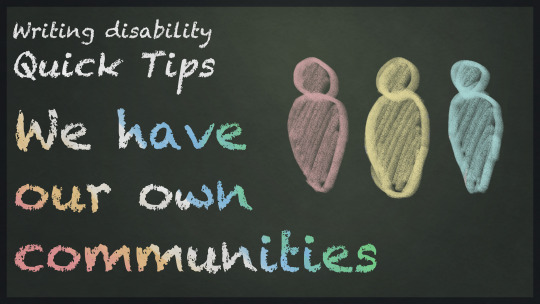
So often, stories centred on disabled characters, especially in modern settings, emphasise how lonely or isolated the character is because of their disability, especially if it’s a newly acquired disability or one that non-disabled people assume would have a big impact on our ability to do “fun stuff”. This will often be accompanied by statements of “no-one understands what living with [insert disability here]” is like!
And while isolation and loneliness are things a lot of disabled people deal with, a lot of us are not completely alone either, especially in the modern day.
Just like any group of people with shared experiences, we find one another. Sometimes this is through formal systems; some spinal rehabilitation centres for example, will pair newly paralysed people up with a mentor who’s had a similar form of paralysis for much longer to help guide the person while the adjust to their new disability. Other more formal systems can look like disability sporting organisations - the one I used to work for used to specifically encourage very newly disabled people to join so they didn’t feel like the had to learn everything about their disability alone, or support groups.
Other times though, these communities are much less formal. They may look like online forums, such as the ones on Reddit, built by and for disabled people to talk about their experiences and seek recommendations from others in the same boat, or parts of larger social media sites. For example, on Tumblr, there aren’t really any formal groups, but thanks to the hashtags we use in our posts, we often find one another fairly quickly there. We sometimes also carve out our own little subsections of fandom or hobby spaces, brought together by the shared interest itself, how things like disability might impact the way you interpret or interact with it, and how we can modify it (in the case of hobbies) to make it work for us.
A lot of disability communities, formal or otherwise, also form out of necessity, such as advocacy groups run by and for disabled people, and those built around ensuring the rights of disabled people are protected.
Isolation and loneliness are problems within the disabled community that many of us deal with, but this tends to be more in the context of isolation from the wider public, exclusion from public spaces and events (despite there being laws that are supposed to stop this because they’re often not enforced), disconnect from non-disabled friends and family, etc, most of which are the result of systematic issues or the lack of understanding or care and support from non-disabled people in our lives. Not always, but often.
The communities made by and for disabled people though are often (at least in part) made to help make up for this, and they’re more common than you might think, you just have to know where to look. It would be nice to see more creators reflecting this in their work a bit more often, or at least acknowledging that they are there, even if your character chooses not to engage with them.
However, as a reminder to authors and creatives:
These communities, especially the online ones, are for disabled people, they are not there for you to use as a reference as a creator. Some communities are ok with you being there to learn, so long as you listen and don’t try to speak over/bombard their members with questions. Others are not. The ones that are, typically will have something written somewhere if it’s online (e.g. subreddits that accept writers wanting to write disabled characters will often have it written in the “about” section or the rules). There are also dedicated groups and platforms for non-disabled people seeking to learn more about us and our communities, which can be excellent resources for creatives like writers. Just remember to be mindful of where you are and respectful of people’s spaces and boundaries when doing your research.
#Writing disability with Cy Cyborg#Quick tips#Disability#Disabled#Disability Representation#Writing Disability#Writing#Writeblr#Authors#Creators#Writing Advice#Disabled Characters#On Writing
272 notes
·
View notes
Text
Did I finally sketch the Zillah scene from memory alone? Yes. Did I got carried away and drew my chaotic pair because the fanfic I have already written in my head slipped through the cracks? Also yes.
Here you go then... A funny "what if Rue and Aubrey actually met as children in a theatre?" Even if it doesn't align with the canon backstory bonus to Zillah finally takes a leap of fate by speaking the truth sketch 💕
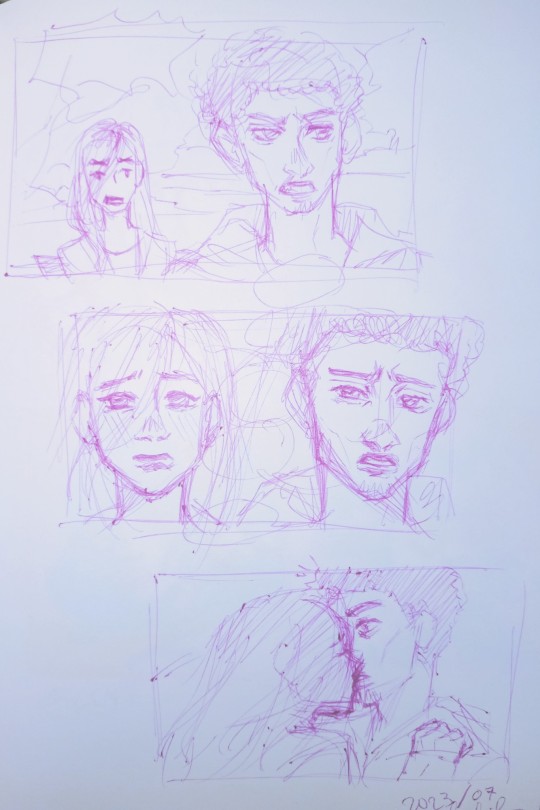
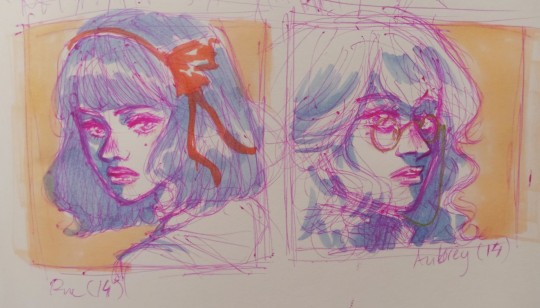
#insomnia does me wonders#this ghost's fanart#interactive fiction#if: fervency#if: superstition#quick messy sketch#listen! the fervency ff has my rue feasting on a previous client she has a grudge again#tipping closer to writing it each day where it not for the fanfic writer curse stopping me#don't @ me for zillah I didn't want to open my laptop tonight 😭#i def need to screenshot that scene *cries*
9 notes
·
View notes